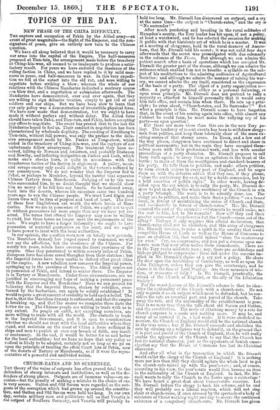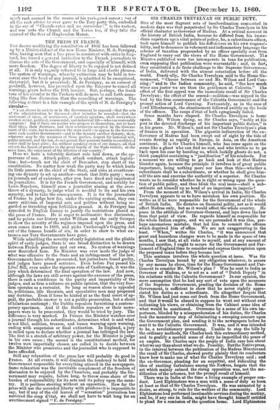CHURCH-RATES AND NO SURRENDER.
THE theory of the value of outposts has often proved fatal to the defenders of strong interests and institutions, as well as the de- fenders of strong places. Outposts are of immense value—on oc- casion—but the penalty of making a mistake in the choice of one is very severe. Gatton and Old Sarum were regarded as the out- posts of the corruption which had grown up around the constitu- tion, and Gatton and Old Sarum were held too long. In our own day, certain military men and politicians tell us that Venetia is
held too long. Mr. Disraeli has discovered an outpost, and a cry at the same time—the outpost is " Church-rates," and the cry is "No surrender!"
After much pondering and brooding in the rural solitudes of Hampden's county, the Tory leader has hit upon, if not a policy, at least a watchword, and he has selected the occasion for making it public with that histrionic art of which he is a master. It was at a meeting of clergymen, held in the rural deanery of Amers- ham, that Mr. Disraeli told his secret; it was not until four days afterwards that the secret was promulgated with due solemnity in the columns of the Times. But although we can admire the patient search after a basis of operations which has occupied Mr. Disraeli the greater part of the recess, although we can admire the reticence which enabled him not to breathe a syllable on the sub- ject of his meditations to the admiring audiences of Agricultural Secieties ; and although we admire the manner of raising his war- cry, we cannot admire the cry itself, considered as the expression of the basis of a party. The object of a party organization is— office. A party is organized either as a personal following, or upon some principle. Mr. Disraeli does not pretend to rally a majority so attached to himself personally that it would carry him into office, and sustain him when there. He sets up a prin- ciple ; he cries aloud, "Church-rates, and No Surrender !" But what a principle is this. Mr. Disraeli seems to have forgotten. that, in the event of his coming again into office, with almost any Cabinet he could form, he must make the rallying cry of his party—an open question ! But there are more vices than this one in the new Tory po- licy. The tendency of recent events has been to withdraw clergy- men from politics, and keep them tolerably clear of the more ex- citing scenes of that stormy arena. In. Essex, and a few out of the way places, clergymen have continued to direct and share in political movements ; but in the main they have occupied them- selves more with their professional work, and less with secular proceedings of a party character. Mr. Disraeli proposes to call them forth again ; to array them as agitators in the front of the battle ; to mike of them the mouthpieces and standard-bearers of his party. He tells them to petition, and make others petition, to form church unions in every part of England, and he urges them on with the delusive advice that they can, if they please, "close the controversy for ever, not by a feeble concession, but by a bold assertion of public right." In other words, having de- cided upon the cry which is to rally the party, Mr. Disraeli de- sires to put in motion the whole machinery of the Church to win a party triumph. The work is to be adroitly done, too. The clergy are to petition, and make their flocks petition " on a tread issue, in favour of maintaining the union of Church and State, and incidentally in favour of church-rates." Has Mr. Disraeli counted the cost of the extensive enlistments he would make, not the cost to him, but to his recruits ? How will they and their • greater cause—not church-rates but the Church—dome out of the affray ? Perhaps it only requires this official declaration, that church-rates shall not be abolished, and this array of clergymen Mr. Disraeli invokes, to raise a spirit its the country that would compel the House of Lords as well as the House of Commons to. pass an abolition bill, that would indeed. "close the controversy, for ever." Cry, no compromise, and. you put a duress° upon mo- derate men that very often makes them immoderate. There are in the Tory ranks moderate men ; nay, there are archbishops and bishops pledged to compromise : these fall under the censure im- plied in Mr. Disraeli's choice of a cry and a policy,. He shuts
the door upon the Archbishop of Canterbury, as well as upon Sir John Pakington, unless they can give the countersign, and he slams it in the face of Lord Stanley. Are these measures of wis- dom, or measures of fully ? Is Mr. Disraeli, practically, the friend of the Church of England, or the ally of the Liberation Society ? But the worst feature of Mr. Disraeli's scheme is that he iden- tifies the nationality of the Church with a church-rate. Ho not only regards it as an outpost which must be defended, but he con- siders the rate an essential part and parcel of the church. Take away the rate, and the nationality of the establishment is gone. This is no more true than the talk about old Sarum and Caton, and the constitution. The mode of obtaining money by a rate for church purposes is a mode and nothing more. It may be, and. . many of us contend it is, a bad mode. If it were abolished to- morrow, the Church of England would still be the national church in the true sense ; but if Mr. Disraeli succeeds and abolishes the rate by stirring up a religious war to defend it, on the ground that it is part and parcel of the Church of England, then he will really
enable the opponents of the Church to say that the Church has lost its national character, just as the opponents of Jewish eman- cipation say that the House of Commons has lost its Cheistitui character.
And after all what is the transaction in which Mr. Disraeli would enlist the clergy of the Church of England ? It is nothing more nor less than that they should agitate the whole land to get the church-rate mixed up with the poor's-rate ; and, of course, . aecording to his view, the poor's-rate would then become au item in the nationality of the Church of England. In fact, Mr. Dis- raeli wants to rally the Church to the Tories upon a subterfuge !
We have heard a great deal about Conservative reaction. Let Mr. Disraeli induce the clergy to back his scheme, and ho and they will probably see a liberal reaction, which will not stop short at church-rates, if once aroused by the spectacle of a body of ministers of Christ working night and day to secure the continued. much rash counsel- in the course Of his variegated career ; hut of all the rash advice he ever gave to the Tory party this, embodied in the cry of "Church-rates and no surrender ! " is the rashest, and woe unto the Church and the Tories too, if they take the counsel of the Seer of Hughendon Manor.



























 Previous page
Previous page